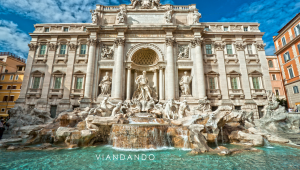Sustainable Luxury Travel: How to Plan Your Next Eco-Friendly Vacation
Experience luxury travel while also being environmentally conscious with these sustainable travel options.
Discover how you can make a difference while indulging in luxury.
Luxury travel doesn’t have to come at the cost of the environment. Explore sustainable travel options that allow you to enjoy the finer things in life while also being eco-friendly.
Looking for ways to travel in luxury while also being sustainable? This guide provides tips and resources for eco-conscious luxury travel.
Luxury travel and tourism have traditionally been associated with excess, opulence, and indulgence, often at the expense of environmental and social sustainability. However, as global awareness of the impact of human activities on the planet and its inhabitants continues to grow, the luxury travel industry is beginning to embrace more sustainable practices. In this section, we explore the concept of sustainability in luxury travel and tourism and how it is transforming the industry.
Sustainability in luxury travel and tourism refers to the responsible and ethical management of environmental, social, and economic resources in a way that minimizes negative impacts and maximizes positive outcomes. It involves considering the long-term consequences of tourism activities and ensuring that they do not compromise the well-being of local communities, the environment, or future generations.
Sustainability in luxury travel and tourism is essential because the industry can have a significant impact on the environment and local communities. Luxury travelers often consume more resources and generate more waste than other tourists, which can contribute to environmental degradation and cultural erosion. Therefore, sustainable luxury travel seeks to balance the desires of travelers for exceptional experiences with the need to protect the planet and its people.
Examples of Sustainable Luxury Travel Practices
There are several examples of sustainable luxury travel practices that can be adopted by luxury travel companies to promote sustainability. These include:
- Sustainable Accommodation: Luxury hotels and resorts can implement sustainable practices such as reducing water and energy consumption, using renewable energy sources, and promoting waste reduction and recycling.
- Sustainable Food and Beverage: Luxury restaurants can serve locally-sourced, organic, and seasonal produce, reducing the carbon footprint of their menus.
- Responsible Tourism Activities: Luxury tour operators can promote responsible and ethical tourism activities, such as visiting cultural sites that contribute to the preservation of local heritage, supporting local businesses, and respecting local customs and traditions.
- Sustainable Transportation: Luxury travel companies can use sustainable transportation options, such as electric or hybrid vehicles, to reduce carbon emissions.
- Philanthropic Initiatives: Luxury travel companies can support philanthropic initiatives, such as environmental conservation projects or social development programs, that benefit local communities and the environment.
Benefits of Sustainable Luxury Travel
Sustainable luxury travel offers several benefits to travelers, local communities, and the environment. These benefits include:
- Enhanced Guest Experience: Sustainable luxury travel provides guests with unique and meaningful experiences that are not available through conventional tourism.
- Positive Impact on Local Communities: Sustainable luxury travel supports local communities by creating employment opportunities, preserving local heritage and culture, and contributing to social and economic development.
- Preserving Natural Resources: Sustainable luxury travel involves promoting the protection and preservation of natural resources such as wildlife, forests, and oceans.
- Cultural Immersion: Sustainable luxury travel often involves experiencing local cultures and customs, providing travelers with a deeper understanding of the people and places they visit.
- Health and Wellness: Sustainable luxury travel often prioritizes health and wellness activities such as yoga, meditation, and nature walks, promoting physical and mental well-being.
- Personal Growth: Sustainable luxury travel often involves activities that encourage personal growth and reflection, such as volunteering, educational programs, and sustainable living practices.
Overall, sustainable luxury travel offers a unique and fulfilling travel experience that not only benefits the environment but also enriches the traveler’s personal growth and cultural awareness.
Sustainable luxury travel is an increasingly popular trend in the travel industry, and for good reason. Not only does it prioritize minimizing the negative impact on the environment, but it also offers a unique and fulfilling travel experience that enriches the traveler’s personal growth and cultural awareness.
At the heart of sustainable luxury travel is the idea that travel can and should be a force for good. By minimizing carbon emissions and supporting local communities, sustainable luxury travel offers a responsible and conscientious way to explore the world. But what sets it apart from other forms of responsible travel is the focus on luxury and personal growth.
Sustainable luxury travel isn’t just about indulging in luxury experiences. It’s also about personal growth and cultural immersion. Many sustainable luxury travel experiences include opportunities to connect with local communities and learn about their customs and traditions. This can take many forms, from volunteering with conservation efforts to participating in cultural workshops and activities. By engaging with local communities in a meaningful way, travelers can gain a deeper understanding of the places they visit and develop a greater appreciation for different cultures and ways of life.
By slowing down and immersing themselves in nature, travelers can gain a new perspective on the world around them and develop a greater sense of mindfulness and gratitude.
Ultimately, sustainable luxury travel offers a unique and fulfilling travel experience that not only benefits the environment but also enriches the traveler’s personal growth and cultural awareness.
Conclusion
When you travel, you have the power to either hurt or help the planet. The case for sustainability is clear: when we travel, we all leave a carbon footprint. It’s up to each of us to make a positive impact and reduce our negative one. But when it’s time to go on your next adventure, consider making tourism sustainable and use these tips to help restore balance on our beloved Mother Earth; this is a tradition that should be carried out for generations to come!
It is our responsibility, as travellers and humans aware of the bigger picture of the world around us, to ensure that tourism is sustainable in the long term. By travelling with integrity and with respect for the environment, we are leaving behind a positive legacy — one that will surely be admired by future generations of travellers.
Make a difference in the world and travel with sustainability in mind – you will feel good inside, have that warm feeling and probably a happy life.
——–
We know it sounds a little awkward to have the word “sustainable” in the same sentence as luxury travel, but after seeing first hand the need for sustainable travel practices we believe in sharing our experiences with other tour operators and offering a choice to our guests. 2023 is about Travel with a Conscience, we’re all in this together, let’s make it a better place!



